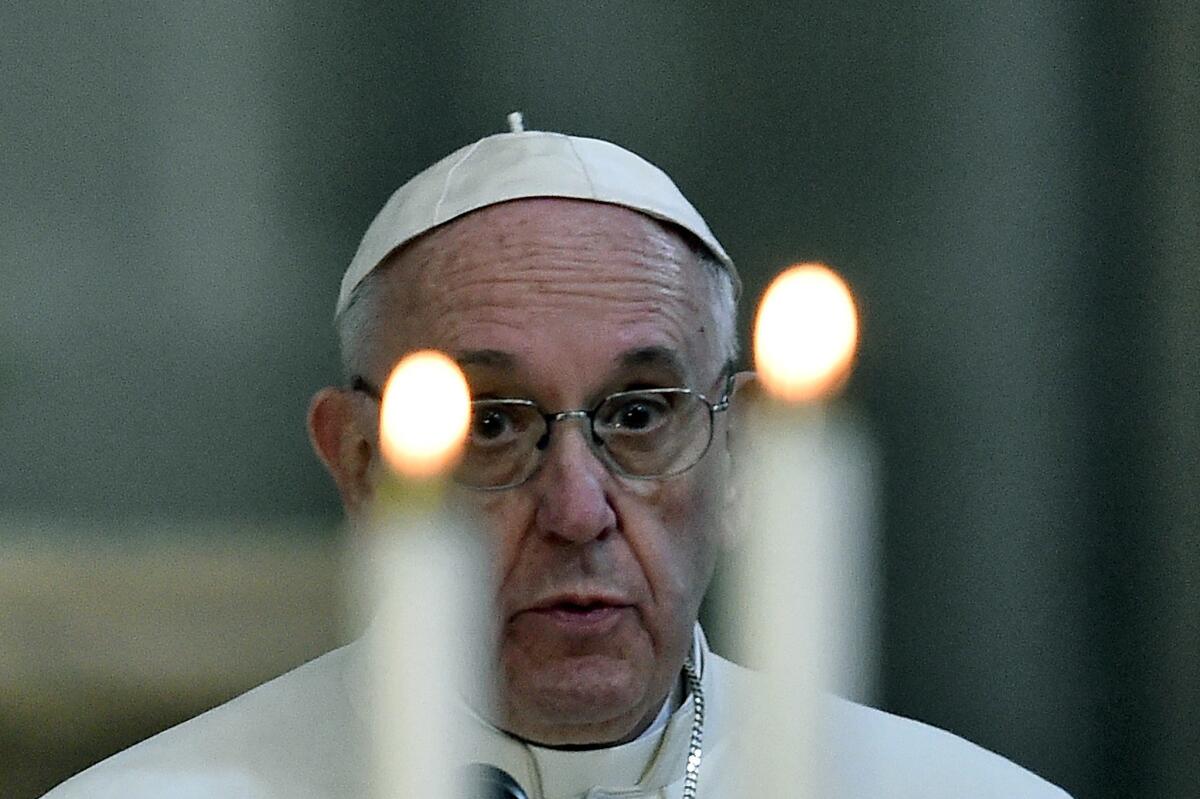As Brazil drifts away from Catholicism, the church remains rigid

- Share via
Last fall, I spent a month in northern Brazil. Although I was there as a rabbi, officiating at services for the Jewish High Holy Days, headlines about the Catholic Church were what grabbed my attention.
Pope Francis had called nearly 200 church leaders to Rome for the Synod of Bishops for the Pan-Amazon Region. Their efforts, after three weeks of discussion, were contained in a report that truly responded to the needs in Brazil, the country with the largest number of Catholics in the world.
The paper affirmed that “celibacy is a gift to the church.” But it went on to recommend ordination for “older, married men, who are respected and accepted by their community” and “a type of official ministry that can be conferred on women” in remote areas of the Amazon where there are very few priests.
This idea shocked the world — but perhaps not the clergy who labor in Brazil and understand the challenges for the church and its congregants there.
The church’s status in the Amazon region is precarious. Catholics in isolated areas go months or even years without attending Mass, while evangelical churches are moving into the interior of the country with the outreach strategies that have brought them extraordinary success elsewhere.
While Brazil is still a Catholic-majority country, it may not be for long. Years ago, Jeffrey Lesser, a scholar of Brazil at Emory University, told me that, within a few decades, Brazilian Protestants would eventually outnumber Brazilian Catholics. He was right and it’s happening fast. The Pew Research Center reported that in 2010, 65% of Brazilians were Catholic. Scholars agree the number has declined since then and many believe it is approaching 50%.
It was no surprise to hear Catholics in Brazil tell me that they hoped the pope would accept the recommendations of the synod. The grave problem they faced needed a new way of thinking.
But last week, Francis said no. His response, “Beloved Amazon,” waxes eloquent on the beauty and holiness of the region. It speaks of the need to respect the environment and the people who live there. And he admits that the church’s missionaries in Brazil “did not always take the side of the oppressed,” for which “I express my shame.” He did not address, as the bishops did, the question of how to turn around the church’s stunning decline in the region.
In some ways, history is repeating itself in his rejection. When I was a congregational rabbi in Rio de Janeiro 35 years ago, John Paul II, known as an anti-Communist, shut down the Brazilian priests who sought to practice liberation theology, a social justice approach to the religion. The priests had hoped to establish small community church groups, or comunidades de base, in poor towns and favelas, bringing people together in a united effort to help one another raise their common standard of living.
I was among the many disappointed by John Paul’s order that the priests stop this effort. We thought that this approach could perhaps improve the lot of the countless Brazilians who lived in poverty.
The impact of the church’s rigidity in that era quickly became apparent and it allowed what was then a nascent evangelical movement to develop. These new churches reached out to Brazil’s poor with less focus on sin, and more on the urgent needs of real life: food, clothing, shelter, education and jobs. Prosperity became a spiritual goal.
Evangelical growth has been spectacular. The Templo de Solomão in São Paulo was built at a cost of $300 million, seats 10,000 worshipers and is as tall as an 18-story building.
Pope Francis is aware that the tendency of past Catholic leadership not to be open to innovation hasn’t served the church well. On the comunidades de base, for example, he has written of his belief that they can be a positive force when they can combine strong advocacy of “social rights with missionary proclamation and spirituality.”
Had his predecessors been more open to such innovation, perhaps the church’s recent history in Brazil would have been different. The question is, in another 35 years, will a future pope regret what Francis has rejected today?
The lesson provided here goes well beyond the Catholic Church and Brazil. This is why, as a rabbi in North America, I am paying such close attention.
We are in an age in which many in the West seem increasingly indifferent to religion. Integrity demands that commitment to our theological principles remain consistent and firm. At the same time, we must take the real world into account in how we apply those principles. It is a delicate balance, but erring too much either way will only lead to irrelevancy.
Clifford M. Kulwin is rabbi emeritus of Temple B’nai Abraham in Livingston, N.J. A former congregational rabbi in Rio de Janeiro, he writes frequently on religious matters in Brazil.
More to Read
A cure for the common opinion
Get thought-provoking perspectives with our weekly newsletter.
You may occasionally receive promotional content from the Los Angeles Times.









